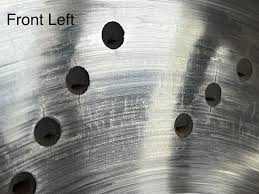
Your vehicle's braking system plays a vital role in safety, and maintaining it properly ensures smooth and reliable performance. Among the key components of your braking system are Brake Pads and rotors, which work together to provide stopping power. However, like any other car part, brake rotors can develop issues over time, including cracks. When you notice a cracked brake rotor, you might wonder: Can it be repaired, or does it need to be replaced? In this article, we'll explore the causes of cracked rotors, the risks of driving with them, and whether repair is a viable option.
Understanding Cracked Brake Rotors
Brake rotors are metal discs that work in conjunction with brake pads to slow down your car. They endure extreme heat and pressure, making them prone to wear and tear over time. Cracks can develop due to excessive heat, stress, or even improper installation. Understanding the type of crack in your rotor can help determine the best course of action.
Types of Cracks in Brake Rotors
- Heat Checking Cracks – Small, superficial cracks that appear due to repeated heating and cooling cycles. These are common and typically harmless unless they expand.
- Hairline Cracks – Slightly deeper than heat-checking cracks, these can compromise braking performance over time.
- Full-Thickness Cracks – Cracks that extend through the entire rotor. These are extremely dangerous and indicate immediate rotor failure.
- Radial Cracks – Cracks that extend from the center of the rotor outward. These are serious and require immediate attention.
What Causes Brake Rotors to Crack?
Several factors contribute to brake rotor cracks, including:
- Excessive Heat Buildup – Hard braking or continuous use, especially in mountainous or high-speed driving, generates excessive heat that weakens the metal over time.
- Worn-Out Brake Pads – If brake pads wear too thin, they increase friction and cause uneven rotor wear.
- Improper Installation – Overtightened or improperly torqued lug nuts can lead to rotor stress and cracking.
- Low-Quality Materials – Cheaper rotors made of subpar metal alloys are more prone to cracking under stress.
- Sudden Temperature Changes – Driving through water immediately after heavy braking can cause thermal shock, leading to cracks.
Can a Cracked Brake Rotor Be Repaired?
In most cases, the short answer is no. Here’s why:
- Safety Concerns – A cracked rotor compromises braking efficiency, making it a serious safety hazard.
- Structural Integrity – Even if a crack is minor, repairing it is nearly impossible without weakening the rotor further.
- Heat Expansion – The continuous heating and cooling cycles of a rotor will likely cause any repair attempt to fail over time.
- Risk of Total Failure – If a crack worsens while driving, it could lead to catastrophic brake failure.
Temporary Fixes (Not Recommended)
Some people attempt short-term solutions, such as:
- Grinding Down Small Cracks – This can only work for surface heat-checking cracks but weakens the rotor in the process.
- Welding the Crack – Welding metal changes its properties and can make the rotor brittle, increasing the risk of failure.
- Using High-Heat Resistant Epoxy – This is not a reliable fix for a part that endures extreme temperatures and pressure.
While these methods may seem like a quick fix, they are not reliable and should never be considered a permanent solution.
The Right Solution: Rotor Replacement
If you have a cracked brake rotor, replacement is the safest and most effective option. Continuing to drive on a cracked rotor increases the risk of accidents and further damage to your braking system. Here’s why replacing the rotor is the best choice:
- Ensures Optimal Braking Performance – A new rotor will provide smooth and consistent braking power.
- Prevents Further Damage – Cracks in the rotor can damage brake pads, calipers, and even wheel bearings over time.
- Increases Safety – Brake failure due to a cracked rotor can be catastrophic. Replacing it eliminates this risk.
- Improves Longevity – High-quality rotors last longer and provide better heat dissipation, reducing the chances of future cracking.
How to Prevent Rotor Cracks
Taking care of your brake rotors can help prevent premature cracking. Here are some useful tips:
- Use High-Quality Rotors – Investing in durable, well-ventilated rotors can extend their lifespan.
- Replace Brake Pads Timely – Worn brake pads increase stress on rotors, leading to cracks.
- Avoid Hard Braking When Possible – Repeated heavy braking causes excessive heat buildup.
- Ensure Proper Installation – Always have rotors installed by a professional to prevent improper torque or stress.
- Regular Brake Inspections – Checking your braking system periodically can help catch issues before they become serious.
Conclusion
A cracked brake rotor is a serious issue that should never be ignored. While some minor surface cracks may not immediately affect performance, deeper or expanding cracks pose a significant safety risk. Unfortunately, repairing a cracked brake rotor is not a reliable or recommended solution. The best course of action is to replace the damaged rotor to ensure your vehicle’s braking system remains safe and effective.
If you’re unsure about the condition of your Brake Pads and rotors, it's best to seek professional help. At Instantcarfix, our experienced Mobile Mechanic team can inspect, diagnose, and replace your brake rotors to keep you safe on the road. Contact us today to schedule an appointment and ensure your brakes are in top condition!





